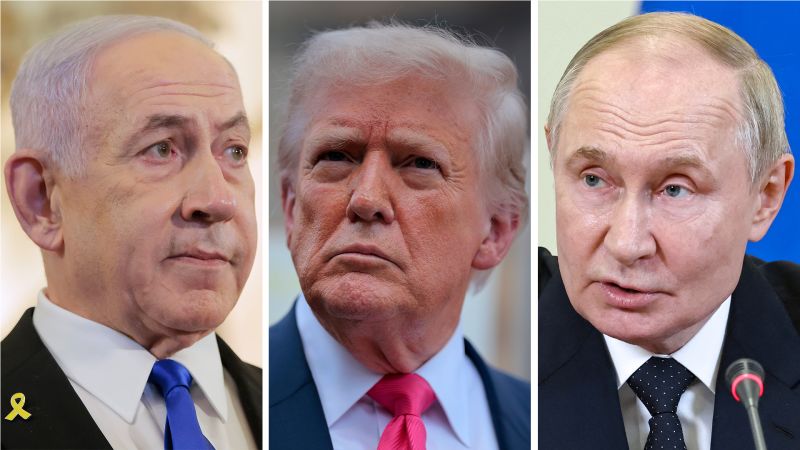Former President Donald Trump has been vocal about his disappointment with recent conversations he has had with various world leaders, particularly amidst escalating wars and humanitarian crises in Ukraine and Gaza. His exchanges with notable figures such as Russian President Vladimir Putin and Israeli Prime Minister Benjamin Netanyahu have yielded dissatisfaction, which he has openly expressed. Trump’s recent statements emphasize how these ongoing conflicts have hindered his aspirations for a Nobel Peace Prize and have proven more complex than he previously anticipated, revealing the limitations of his personal relationships with these world leaders.
During a call with Putin, Trump conveyed his disillusionment, criticizing the Russian leader’s actions in Ukraine as increasingly erratic and violent. He suggested that despite their past camaraderie, Putin’s behavior has become “absolutely crazy,” as evidenced by the relentless missile and drone attacks on Ukraine. This troubled relationship is emblematic of Trump’s broader struggle to manipulate his connections for favorable outcomes in international affairs. His frequent lamentations about diplomatic conversations that do not have practical results extend to his dealings with Netanyahu, who has engaged in military actions in Gaza, leading to a humanitarian crisis that has generated international outrage and sparked dissent within Trump’s political allies.
The discomfort Trump feels is not isolated to Ukraine and Israel; it extends to his interactions with other leaders as well. For example, his friendship with Indian Prime Minister Narendra Modi has turned complicated as trade negotiations progress, and his once amicable communication with North Korean leader Kim Jong Un has faltered, with Kim showing hesitance to engage after previous dialogue. Trump’s unorthodox method of diplomacy, characterized by direct communications through his personal cell phone, improved some relationships but has also led to a realization of its inherent limitations.
Despite facing challenges in these international fiscal and humanitarian dilemmas, Trump received a nomination for the Nobel Peace Prize from Netanyahu, which was presented dramatically during a dinner in the White House. However, this gesture has been put to the test due to the violent escalation in Gaza, culminating in actions that have sparked Trump’s ire, including bombings that resulted in civilian casualties and damage to cultural sites. These events prompted Trump to express empathy for the suffering of the children depicted in distressing images, leading him to rethink his supportive stance on the Israeli government amidst the ongoing crisis.
As he observed distressing content about the humanitarian situation from Scotland, Trump reportedly indicated a desire to explore ways to ameliorate the crisis during communications with Netanyahu. The images of suffering children resonated deeply with Trump, impacting his rhetoric and urging a reevaluation of his stance towards Israel’s actions. His wife, Melania Trump, also influenced his perspective regarding the humanitarian tragedy, highlighting the human emotional responses that can impact political dialogue.
Trump’s frustrations have been emboldened by a perceived duplicity from both Putin and Netanyahu, causing him to reassess the dynamics of their relationships. Where once he had felt a clear path towards resolution, he now finds himself stagnant, echoing sentiments of disappointment and concern for failing to realize a peaceful resolution in these two longstanding conflicts. His commentary stresses how he believed their ties would yield constructive discussions and barely scratches the complex nature of international relations where personal connections often fall short in achieving tangible results.
While Trump’s interactions with world leaders signify a tumultuous balancing act of diplomacy, it has become increasingly clear that cordiality does not guarantee compliance. For instance, despite acknowledging that he got along well with Putin at a time of potential deal-making, the escalating conflict in Ukraine suggests a growing rift between anticipated promises and real-world outcomes. Similarly, his relationship with Netanyahu, while historically characterized by strategic alignment, faces scrutiny as the Israeli leader’s military operations in Gaza evolve.
While Trump’s administration made various overtures toward bolstering the relationship with Israel — including lifting restrictions on arms and vocal support in military operations — accusations arose that Netanyahu was leveraging the conflict for political gain, creating a complex web of expectation and disappointment between the two leaders.
Moreover, as international leaders, such as British Prime Minister Keir Starmer, step in to coax Trump towards exerting influence in alleviating the humanitarian suffering in Gaza, Trump’s recent statements and actions suggest a recalibrated approach. He is now acknowledging that conditions require a delicate balance of maintaining support for Israeli operations while addressing the dire circumstances faced by civilians. Thus, as Trump continues to navigate these delicate and forceful international waters, it becomes essential to glean insights into the efficacy of personal diplomacy in resolving multifaceted global conflicts.











